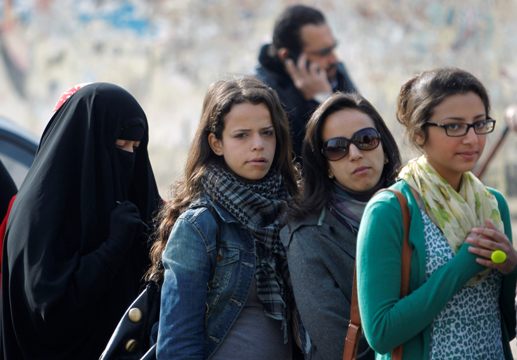Latest NEWS
- Aswat Masriya, the last word
- Roundup of Egypt's press headlines on March 15, 2017
- Roundup of Egypt's press headlines on March 14, 2017
- Former Egyptian President Hosni Mubarak to be released: lawyer
- Roundup of Egypt's press headlines on March 13, 2017
- Egypt's capital set to grow by half a million in 2017
- Egypt's wheat reserves to double with start of harvest -supply min
- Roundup of Egypt's press headlines on March 12, 2017
Egypt listed worst country for women, why? - INTERVIEW

(ARCHIVE)Egyptian women wait in line to cast their votes on the new constitution. Khaled Abdullah/Reuters
By Saif Eldin Hamdan
Egypt was rated the worst country in the Arab world to be a woman, whereas Comoros came on top of the list, according to a poll by Thomson Reuters Foundation released on Tuesday. However, it does not clarify how Egypt wound up at the bottom of the list regarding women's rights, freedom and status.
Aswat Masriya interviewed Monique Villa, the Thomson Reuters Foundation CEO, about the methodology used in the poll to assess its credibility and accuracy.
Villa said that the foundation polled 600 gender specialists in the region, but only used the fully completed surveys, which amounted to just 336 responses. The poll participants included academics, healthcare workers, journalists, women's rights activists and policy makers.
The survey had 36 questions assessing to which extent Arab countries adhere to the main provisions of the U.N. Convention on the Elimination of Discrimination Against Women (CEDAW), which is signed, ratified and endorsed by most of them.
The questions, based on six key aspects of the CEDAW, addressed the status of women in politics, society, economy and family, their reproductive rights and violence against them.
Comparing the statuses of women in the Kingdom of Saudi Arabia (KSA) to Egypt, Villa said that women in KSA have access to healthcare, education, finance and contraception, despite that they cannot drive without a male guardian.
Regarding Egypt's low ranking, Villa said that the poll clearly reflects that traditional patriarchal norms have been reinforced, in addition to an upsurge in violence, instability and corruption, all combined with total impunity for the perpetrators of violence.
“Egypt scored badly in every category, from violence against women, to reproductive rights to the treatment of women in the family and their inclusion in politics and the economy. The poll shows that, almost three years after the revolutions, three out of five Arab Spring countries are ranking at the bottom of the list.”
The survey attributed Egypt's rank as the lowest of 22 Arab states to high rates of sexual harassment, female genital mutilation, in addition to discriminatory laws and a surge in trafficking and violence.
“Sexual assault has become a political weapon, even in Tahrir Square [the iconic symbol of Egypt's January uprising], where, in some cases last summer, women have been raped as a tentative to intimidate and silence them,” Villa added, citing that this is not her personal opinion but it is based upon the experts' feedback.
In the same respect, a Cairo-based researcher for the Egyptian Initiative for Personal Rights pointed that sexual harassment and violence remarkably intensified in Egypt starting 2005, with the upsurge of women’s political participation that engaged them in the public sphere, according to Dalia Abdel Hameed, a researcher for the Egyptian Initiative for Personal Rights.
“Sexual violence was used to punish women for taking part in the mass demonstrations of the Egyptian revolution, in which women played a prominent role,” Abdel Hameed said in a recent interview with Aswat Masriya.
The poll is not based on a comprehensive survey. “This is a perception poll that is based on gender experts’ vision of women’s rights across the Arab League countries,” said Villa.
She added that the Thomson Reuters foundation aims at covering the world's under-reported stories, saying, "We shed light on issues others refuse to cover. And polls are a way of doing this. We gather data, crunch it and put it into perspective to highlight global issues such as women’s rights."
This is the third annual poll on women's rights in Arab states after the Arab Spring by the Thomson Reuters Foundation. It was published along with reports, features and a factbox with the contribution of Aswat Masriya.










